This story is published in partnership with KCET / PBS SoCal.
In sunny Southern California perched by a large asphalt road, there is a Uyghur restaurant called Dolan’s, located in the thick of a neighborhood with one of the most substantial Chinese populations in the United States. Sandwiched between a handful of prominent regional Chinese restaurants on the edge of suburbia, Dolan’s is vigilant about exercising its right to freedom of expression.
The name of the restaurant, Dolan’s, is a nod to what the Chinese province of Xinjiang was called before it was occupied by the Chinese, and the menu is prefaced with a brief explanation of the Uyghur people and their culture. The restaurant’s logo is a proud rendering of a mustached man with his nose up high, wearing a traditional Uyghur headdress called a doppa, and the inside of the restaurant is adorned with paraphernalia inspired by home — embossed floral vases, stained glass lamps, and joyful paintings of the Uyghur people. Freshly-pressed white tablecloths on every table give the space a sense of decorum, as if one were transported to a high-end restaurant in Ürümqi, the metropolitan capital of Xinjiang.
Uyghurs are a Turkic ethnic group centered primarily in the Xinjiang province of Western China. Xinjiang is Mandarin Chinese for “new boundary” — a region violently claimed in the early 20th century by the Chinese government after years of war and conflict between the Uyghurs and the Chinese. Today, there’s a cultural genocide happening in the province, with more than 3 million Uyghurs imprisoned in detention centers, where their language, religion, and way of life are slowly being wiped out by forced sterilization and labor. The Chinese government denies these accusations, insisting these centers are education camps necessary for mitigating religious extremism and terrorism.
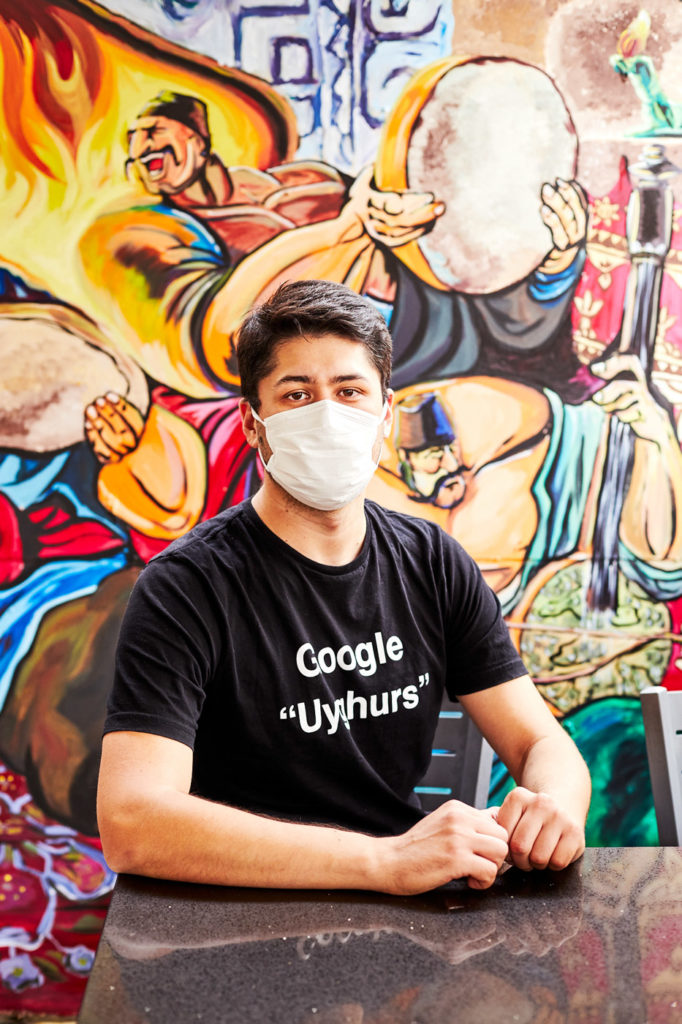
Dolan’s is explicit in how they feel about these claims, and the staff quite literally wear their feelings on their sleeves. The restaurant uniform consists of white text on a black T-shirt, which reads: “Google ‘Uyghurs.’”
“There’s a large Chinese population in the area, so in the beginning I was scared that they would be offended,” admits Bugra Arkin, owner of Dolan’s. His restaurant is positioned in the city of Alhambra in Los Angeles County, a town whose population is 51.2% Asian and largely Chinese. But Arkin chose this neighborhood purposefully. While he was worried about potential backlash, he knew the area would be more receptive to Uyghur food. “In the U.S., people can’t even pronounce Uyghur. But in China, all people know about Uyghur food,” he says. In China, Xinjiang cuisine is considered a popular regional specialty and one of the few elements of Uyghur culture that has been appropriated for the masses; Uyghur restaurants can be found in every major Chinese city, from Beijing to Shanghai.
“Uyghur food, Uyghur people, Uyghur culture has nothing to do with Chinese culture,” Arkin stresses. “We are not a fusion between Chinese food and Turkish food.”
In 2015, Arkin moved from Xinjiang to Los Angeles to pursue a masters’ degree in international policy and trade at the University of Southern California, but quickly realized he would not be able to go home after news of the camps broke out. “I couldn’t go back to my hometown because of the genocide that is going on,” he says. So in 2019, he opened up Dolan’s as a way to share his culture with the world.
Arkin speaks fluent Mandarin and says he often has conversations with his Chinese clientele about the camps in Xinjiang. “Sometimes they will completely disagree, but other times some people will show up the next day and show their support,” he says. “There’s no problem between the Chinese people and the Uyghur people. The problem is the Chinese Communist Party.”
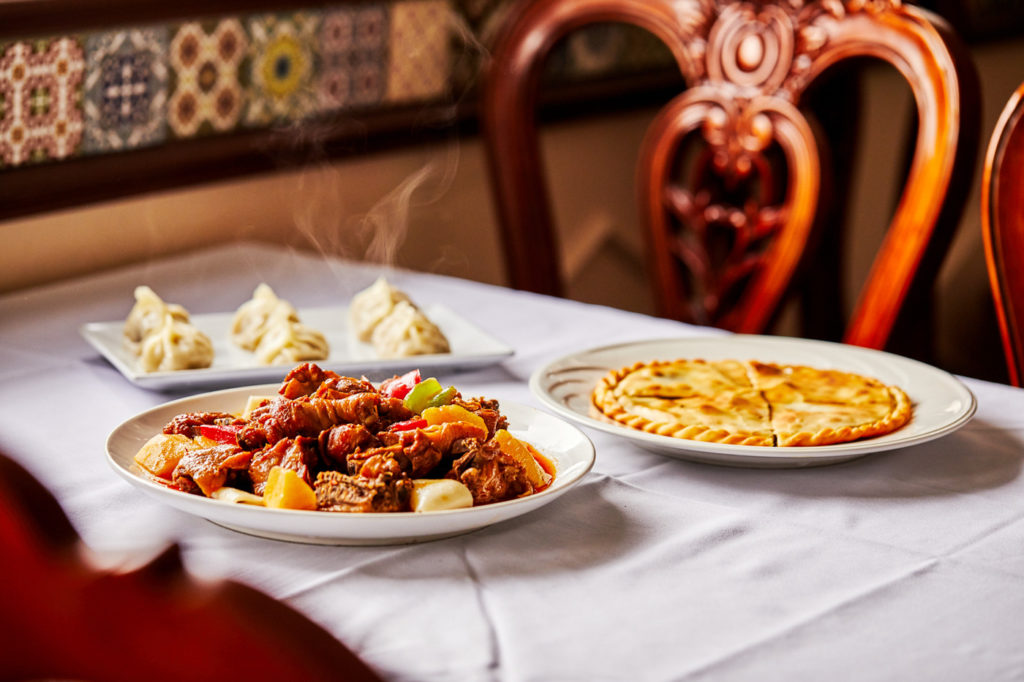
Of course, his customer base isn’t limited to the Chinese-speaking world. Los Angeles is a melting pot filled to the brim with curious eaters, and food is his way of reclaiming and sharing his identity with the world. The menu is a neat compilation of the regions’ classics, a cuisine heavy on pepper and cumin — it’s more Central Asian in flavor profile than East Asian. Located in the arid northeast enclosed by towering mountains, Xinjiang is a place where a hearty meal means wheat, potatoes and meat. The tour de force at Dolan’s is the iconic big plate chicken, composed with silky handfuls of freshly-pulled noodles layered with heavy chunks of butchered chicken, bright red chiles and leeks. The smell of cumin drifts in and out of the eatery, and covers long, tender strips of lamb and beef kebabs. Dumplings are filled with soft and hefty chunks of pumpkin, steamed so they are semi-transparent with an orange center, and a side of vegetables means thin, julienned strips of stir-fried potato, dripping with a bright, sour and spicy sauce.
“Some people ask me how I invented this food,” Arkin says, noting many of his customers told him they thought he was serving a brand new category of fusion food. “But I didn’t invent this. This is what Uyghur food looks like.”
He also serves large discs of what’s called goshnaan, a meat pie stuffed with piping hot lamb and beef chunks, broiled so the flatbread bubbles and is charred on top. The whole thing is held together by a tight twisted braid around the perimeter of the disc, and the insides are juicy and bursting with flavor.
Dolan’s isn’t the first restaurant to serve Uyghur cuisine in Southern California. Just a couple blocks away is Omar Halal Restaurant, which was founded by Munire Omar and her family in 2010, who are also from Xinjiang. The menu is similar, and they also serve handmade noodles. “We’re friends,” says Arkin. “But we’re all independent.”
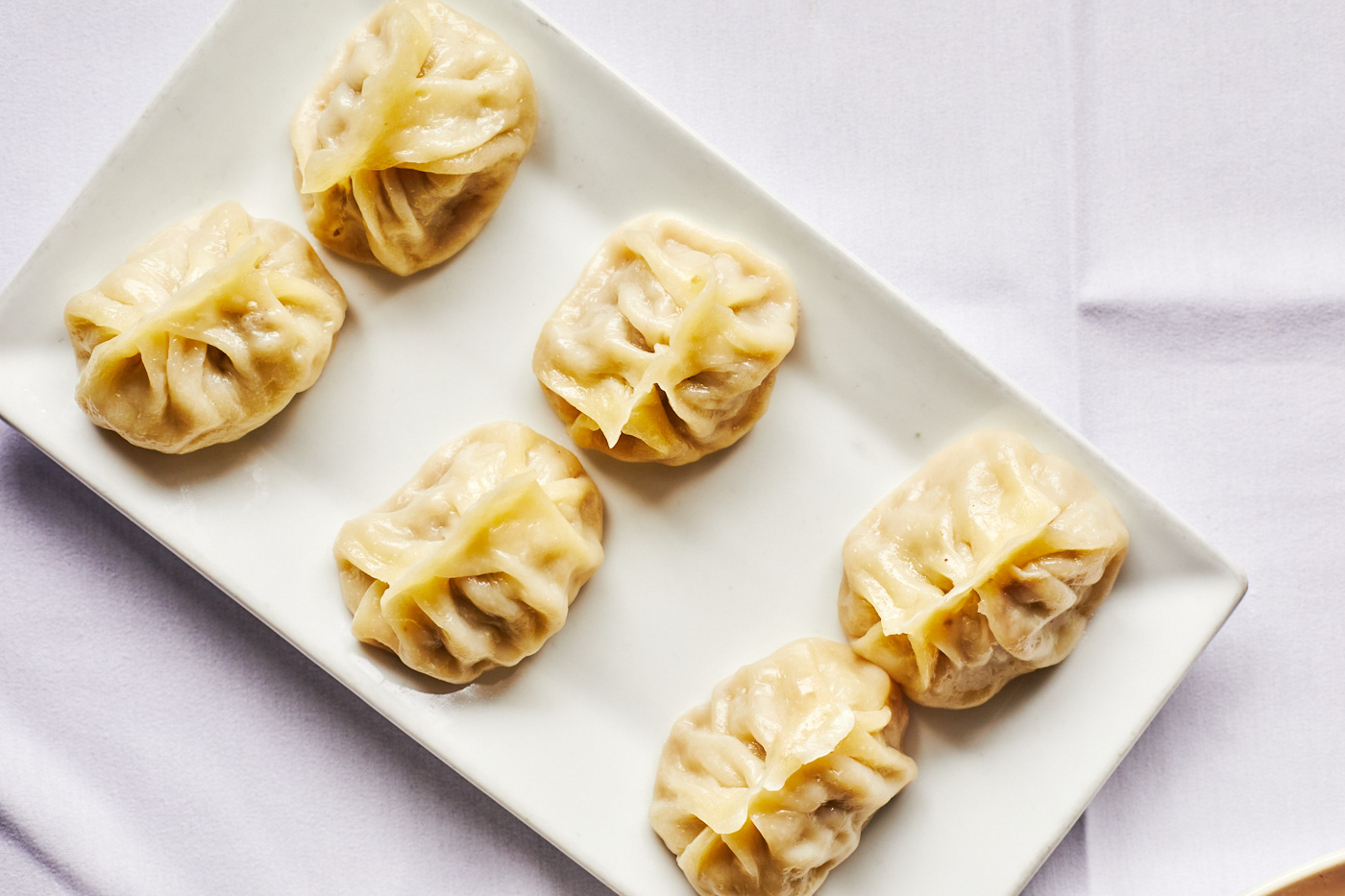
Compared to places like Kazakhstan, Uzbekistan and Turkey, the Uyghur diaspora in the States is small, and is primarily concentrated on the East Coast, in Washington D.C. in particular. “Radio Free Asia, which was created during the Cold War by the U.S. government, established a Uyghur-language broadcast earliest out of Munich and then out of Washington D.C.,” explains Dru Gladney, a professor of anthropology at Pomona College who studies China’s ethnic minorities. Radio Free Asia’s goal is to provide news to Asian countries without a free press. “Because of the language broadcast, Uyghurs were hired and they got good jobs. And that led to a chain migration.”
In Southern California, there’s only about a thousand people of the diaspora in the region. And the Uyghur restaurant scene is even smaller. “Omar, in 2010, was the first Uyghur food I remember in L.A.,” says David R. Chan, a retired accountant who has eaten at over 7,000 Chinese restaurants around America. Over the last 40 years, Chan, who is based in Los Angeles, has kept a meticulous log of Chinese restaurant openings in a spreadsheet. He estimates there have only been six to seven other Uyghur restaurants across Southern California in the last 10 years. The only other significant community of Uyghur restaurants in the States besides the greater Los Angeles area is concentrated in Washington D.C.
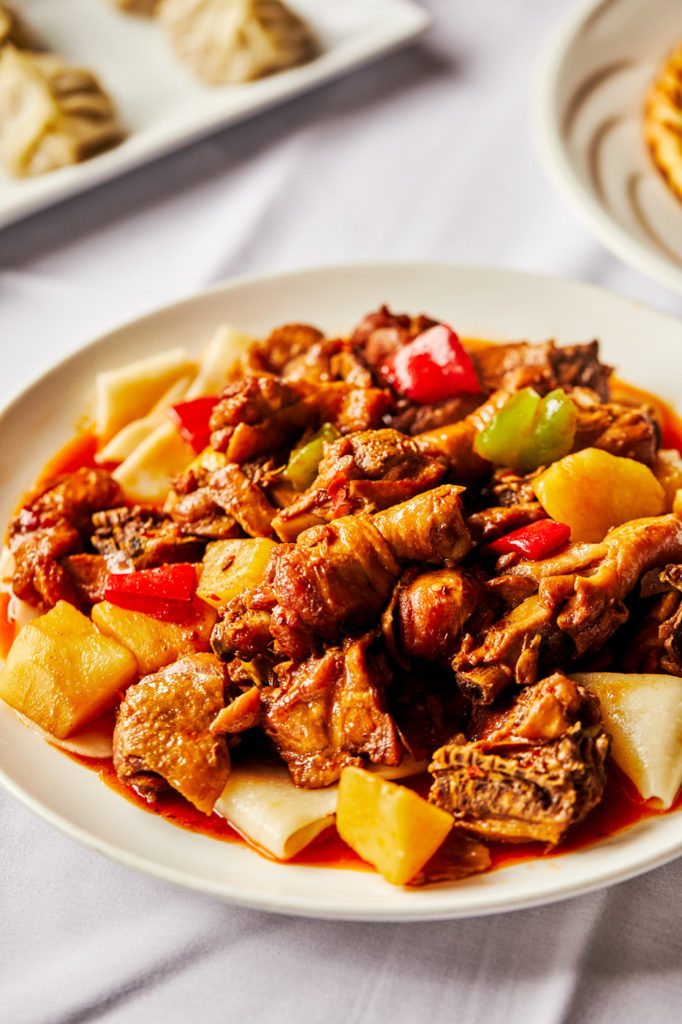
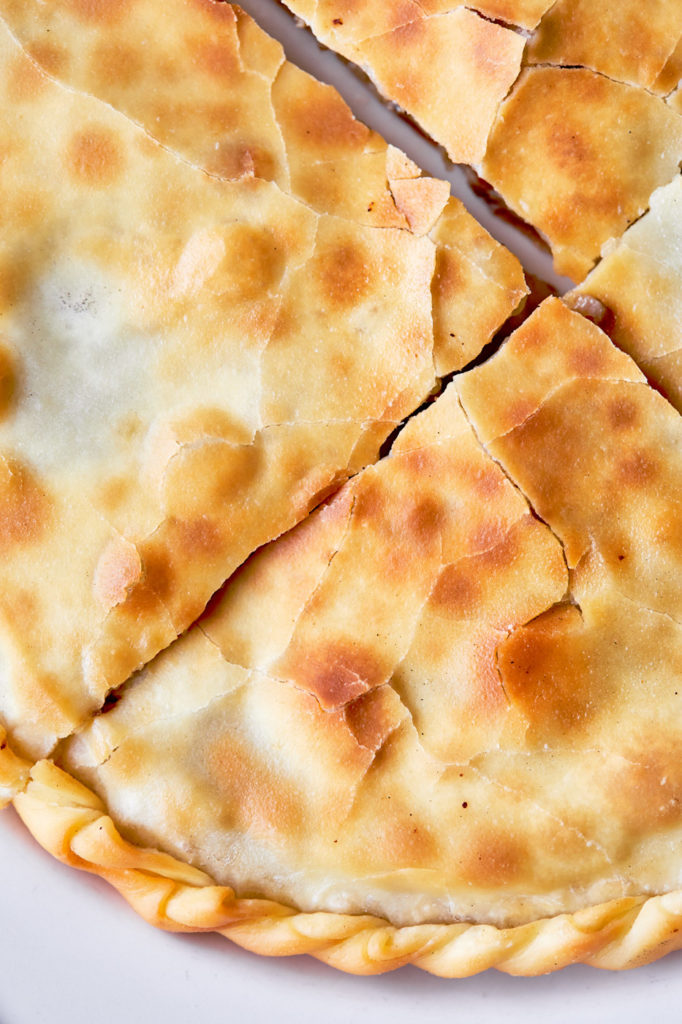
While Arkin isn’t alone as a Uyghur restaurateur in Southern California, his place is the only one in the neighborhood with a pointed political message. In many ways, the restaurant is a metaphor for how Arkin wishes Xinjiang could be — as its own distinct entity. And the political activism he has fused into his food isn’t just a marketing quirk; it’s extremely personal. “My father has been in prison since October 2018,” he says. “I have no information on whether he’s alive or not. He just disappeared. The Chinese government has not provided any information or warrant. My mom and sister are okay, but they are constantly threatened by local police in China.”
Because Arkin is so vocal about the plight of the Uyghurs, he says he has gotten death threats sent directly to his restaurant in California by Chinese officials, and that his mother’s phone has been implanted with a tracking app that will notify the authorities if he contacts her. “Last year, I was very scared,” he says. “They promised me they would release my dad. But even when I kept silent, nothing happened and nothing improved. So last year in December, I started my campaign again.” He says he has no idea why his dad was imprisoned. His father used to work in publishing, but specialized in Chinese government textbooks. “I heard one of the reasons he’s detained is because he came to the United States to visit me at USC,” he says. “When he went back [to Xinjiang], he faced a lot of problems with the police.”
Stuck on the other side of the world, Arkin desperately wishes he could go home to see his family, although there’s not much he can do except raise awareness. But he finds solidarity with his staff; all of them are Han Chinese refugees who have fled China for some reason. “Some are religious refugees, others are political refugees,” he says. And they all proudly wear the “Google ‘Uyghur’” T-shirt in hopes that one day the status quo will change.
For Arkin, food is his medium to convey his sense of cultural autonomy, and he hopes that while people enjoy the flavors of his hometown — heavy spices swirled together with the smoky aromas of chargrilled meat — that they could also educate themselves on the grim realities of modern Uyghur culture. Political awareness is not a prerequisite for dining at his restaurant, of course. But he isn’t shy about diving straight into the topic when asked.
“We used to have a beautiful life, but everything is destroyed,” Arkin says. “My hope is to release my father and release all the innocent Uyghur people in the Chinese concentration camps.”





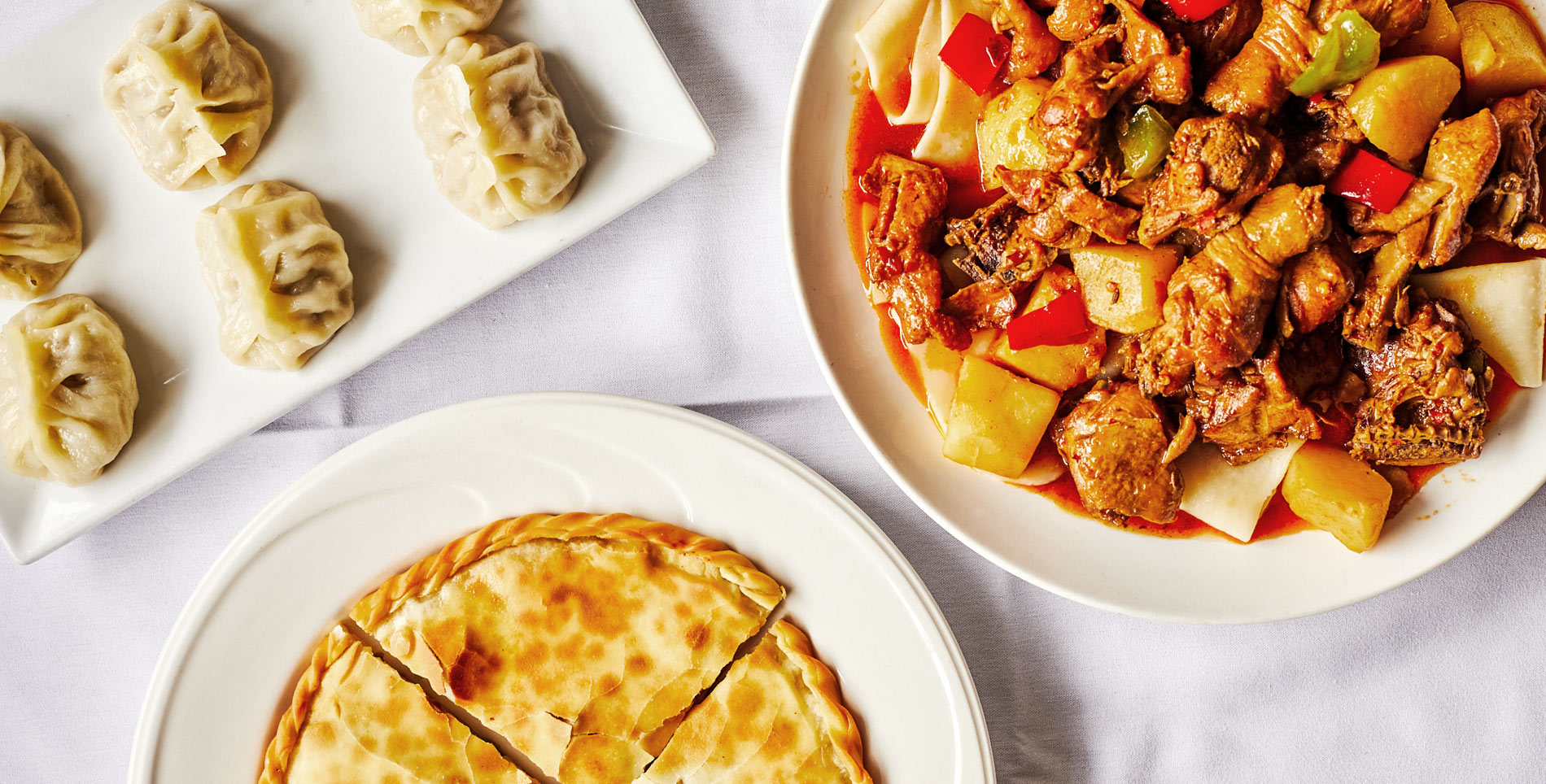

Our comments section is for members only.
Join today to gain exclusive access.